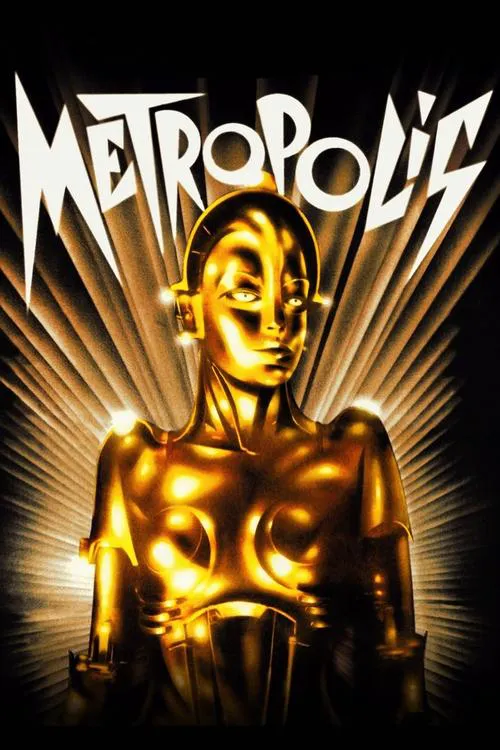Metropolis

Plot
In the sprawling metropolis of the early 21st century, a stark dichotomy has taken hold. The skyscrapers of the city's elite, situated at its very center, pierce the clouds, symbols of unbridled wealth and power. In stark contrast, the sprawling slums lay at the city's periphery, with inhabitants barely eking out a meager existence. It is within this sharply divided landscape that the tale of Metropolis unfolds, a cautionary narrative penned by German expressionist master Fritz Lang. The film's narrative centers on Freder, the son of the omniscient and omnipotent Joh Fredersen, mastermind behind the city's majesty and its myriad of technological wonders. Freder's privileged existence is one of luxury and comfort, insulated from the struggles of the city's underclass. Following a chance encounter with Maria, a prophet and advocate for the city's downtrodden, Freder's life is forever altered. Maria speaks of a savior, a messianic figure who will reconcile the city's warring factions and usher in a new era of unity and equality. Drawn to Maria's words, Freder becomes increasingly disillusioned with his sheltered existence. As he delves deeper into the world beyond his glass-walled sanctuary, he begins to grasp the injustices perpetuated by his father's regime. The city's underclass toils tirelessly in the depths of the metropolis, their souls snuffed out by the monotony and drudgery of their existence. Meanwhile, the ruling elite – a fetid, decaying aristocracy – feasts and indulges, wallowing in the squalor they've created. As Maria's message resonates with Freder, he becomes entangled in a perilous dance of rebellion and resistance. Amidst the labyrinthine corridors of the metropolis, he navigates a complex web of intrigue and deception. His burgeoning bond with Maria serves as a beacon of hope for the city's disaffected, fueling fantasies of a utopian future. In turn, his opposition to his father's tyrannical rule imperils his own life and puts him at odds with those he once considered friends. These developments unfold within the city, where Lang's uncanny ability to anticipate the anxieties of modernity proved prescient. From early warnings about the dangers of unchecked technological advancement to trenchant critiques of capitalism's tendency to erode empathy and compassion, Metropolis finds the Director drawing on his own vision of a dystopian future. His cinematic narrative becomes a vibrant, living tapestry, weaving myth and prophecy, social critique and commentary on the human condition. Through Freder's tragic trajectory, Lang explores the seductive allure of revolutionary fervor. No stranger to Germany's turbulent politics, Lang was keenly aware of the destructive allure of extremist ideologies. In Metropolis, these ideologies are transposed to the world of the sci-fi epic, lending a fantastical sheen to the philosopher-king Freder's doomed mission. The trajectory of Freder's story underscores the gravity of his predicament, one complicated by the impossible nature of his quest. Confronted by the crushing weight of the metropolis's bureaucratic inertia, he becomes aware of the insurmountable obstacles that stand between him and his lofty ideals. Nevertheless, he presses on, sustained by a deep conviction that collective reform is not a utopian fantasy, but a necessary reality. In his celebrated monologue, Freder cries out against the dehumanizing effects of a system that systematically disintegrates bonds of solidarity and community. His passionate eloquence speaks to the fragmented experience of living in a society that disdains human connection. Confronting the indescribable horrors emanating from the very fabric of his father's 'utopia', Freder implores his social peers to bear witness to the anguish of the downtrodden and to join him in a crusade to reshape this fractured world. While Metropolis's eerie representation of the cityscape draws attention to its own sense of existential anguish, it has an added significance that further illuminates Lang's genius. At its core, the film presents a compelling assertion that freedom and progress can only be conceived as shared, communal projects, grounded in mutual recognition and respect – the antithesis of the cold, antiseptic, industrial landscape of the future cityscape. This dark vision of societal disintegration, a parable warning about the devastating cost of a metropolis reduced to an effete, sprawling concentration of faceless automatons, forms a counter-narrative to both technocratic utopianism and redemptive individualism. A vision grounded in the raw, visceral humanism – rather than vaunted reason or calculation – becomes more readily feasible, especially when given the tenebrous backdrop of an apocalyptic urban landscape. Despite the sense of world-shattering peril that pervades its most iconic imagery – particularly in the striking interplay of light and shadow – Metropolis carries with it a resolute, elegiac message. Without losing sight of its portrayal of unvarnished despair, Lang underscores the fragile, flickering possibilities of solidarity and collective resistance against a backdrop of dystopian ruin.
Reviews
Recommendations

